Healthy soil is the foundation of healthy plant life, and by placing organic fertilizers like chicken manure pellets in your gardening routine, you can greatly increase soil fertility & improve its structure. This blog post focuses on the science behind using organic chicken manure pellets, including their nutrient composition and how they promote strong and sustainable plant growth. We will consider the advantages of these simple-to-use pellets, such as the balanced release of necessary nutrients, better soil ventilation, and increased water-holding capacity. Further, we will give application techniques that beginners and skilled farmers can successfully incorporate into the care of plants. At the end of this article, readers will have a better knowledge of how best to use these organic pellets to attain maximum plant growth and soil fertility in an eco-friendly manner.
What Are Organic Chicken Manure Pellets and Why Are They Effective?
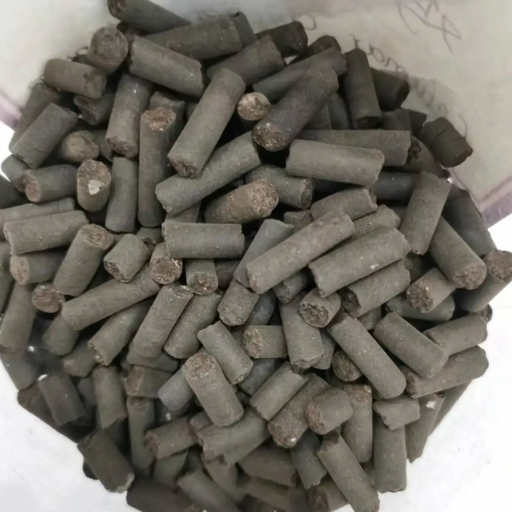
Organic chicken manure pellets are processed, concentrated and compressed into small dry pellets. These pellets are effective because they have a high content of nutrients such as nitrogen, phosphorous, and potassium, which are important for plant growth. Organic chicken manure pellets, different from synthetic fertilizers, release nutrients slowly, hence guaranteeing a consistent supply that minimizes nutrient leaching risks. In addition, trace elements and beneficial microorganisms in them help improve soil structure and root development and enhance soil fertility at large, thereby making these pellets sustainable.
Understanding Chicken Manure Pellets
Chicken manure does not contain any large amounts of macronutrients; however, the following typical values approximate 3-3.5% N (nitrogen), 2.5-3% P (phosphorus), and 1.5-2.5% K (potassium). These figures, often used on lab reports, mean that the compound has a satisfactory balance between N-P-K required for vegetative growth, flowering, and fruit set-up. Additionally, secondary nutrients such as magnesium (Mg), calcium (Ca), and sulfur (S) play a very important role in many metabolic processes of plants.
They possess slow-release properties owing to their organic nature, which continuously supplies nutrients over time, thus minimizing nutrient runoff/leaching common with synthetic fertilizers. Furthermore this promotes diverse microbial populations that enhance nutrient availability in the soil for crop uptake. On technical grounds, their impact on soil structure is defined by its organic matter contents, which range between 50-60%. It helps to aerate roots better while reducing the compactness of soils, thereby promoting more vigorous root growth, leading to higher crop yield.
Nutrient Composition of Chicken Manure Pellets
Regarding nutritional value, chicken manure contains essential macronutrients, including micronutrients necessary for healthy plants. The main macronutrients are nitrogen (N), phosphorus (P), and potassium (K). In particular, the average composition has a nitrogen content of 3-3.5%, phosphorus ranging between 2.5-3.0% and potassium from 1.5 to 2.5%. These figures represent a balanced N-P-K ratio that is essential for overall plant development, including vegetative growth, flowering, and fruiting phases.
In addition to macronutrients, chicken manure pellets contain minerals like calcium (Ca), magnesium (Mg) and sulfur (S). Calcium helps maintain strong cell walls while magnesium forms part of chlorophyll and sulfur is needed to synthesize amino acids’ structure. Besides these, trace elements such as zinc (Zn), copper (Cu), and iron may also be found in their micronutrient profile, thus indicating their roles in different enzymatic activities or physiological functions occurring within plants.
It is important to note that organic matter should range from about 50-60% to improve soil structure. Consequently, organic matter enhances soil porosity and water holding capacity, which consequently enhances root aeration, leading to decreased soil compaction. Moreover, this reduces environmental problems like nutrient runoff or leaching because the nutrients are released slowly over time.
Additionally, having these microorganisms in organic chicken manure pellets means that there will be high species richness within the soils where they are applied. These organisms help release nutrients bound to complex molecules, thereby making them more accessible to plants, resulting in improved crop performance and increased yields.
Can manure from a chicken be used in all kinds of gardens?
Chicken dung is commonly safe to use in most types, however, its application and handling should be done right. It is especially useful for vegetable gardens, ornamental plants, and fruit-bearing trees due to the richness of its nutrients. However, it must be well decomposed so as to kill pathogens and reduce the risk of scorching plants resulting from high nitrogen levels inherent in it. In addition, correct application rates must be observed to avoid nutrient imbalances and excessive losses through leaching. Generally, when properly applied, chicken manure can serve as a boon to different garden designs, thereby encouraging healthy crop development and enrichment of soils.
Comparing Chicken Manure to Other Fertilizers
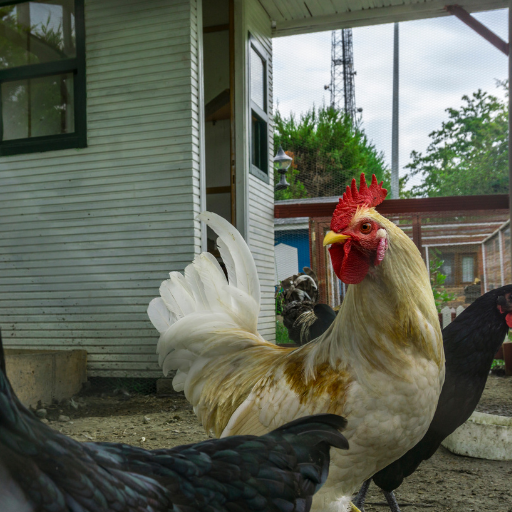
Several factors determine how chicken manure compares to other fertilizers, including nutrient content, environmental impact and release rates. For example, chicken manure is a good source of nitrogen, phosphorus, and potassium – needed by plants for growth- but its organic nature improves soil structure as well as promotes microbial activity, thereby supporting soil health. Conversely, synthetic fertilizers may offer precise nutrient compositions and faster nutrient release but often lack the soil health benefits that organic options provide. On the other hand, cow manure, another frequently used organic fertilizer, has lower concentrations of nutrients than chicken manure, making it necessary to apply more quantity to achieve comparable results. Also, chicken manure’s nutrient release rate is relatively fast compared to composted cow manure, which is slow, and synthetic fertilizers, which are quick.
In the end, however, synthetic fertilizers provide immediate availability of nutrients, while chicken dung acts in a balanced way to provide instant plant nutrition and maintain soil fertility.
Cow Manure vs. Chicken Manure
When comparing chicken manure with cow manure, several technical parameters need to be considered. Chicken waste generally contains higher amounts of major nutrients like nitrogen (N), phosphorus (P) and potassium (K). Specifically, the average composition for chicken droppings usually stands at 1.5% N, 1% P, and 0.5% K, providing immediate availability upon application. However, cow dung averages around 0.6% N; 0..4 P; 0..5 K, implying larger volumes must be applied to equalize what was lost through evaporation when using it instead of poultry droppings.
Chicken litter has a fast nutrient release rate because its C:N ratio at around 6:1 is reduced compared to cattle excreta’s C:N ratio of approximately 20:1. Cow dung releases too slowly with higher organic matter that enhances soil structure and water holding capacity over a long time for sustainable soil health. On the other hand, this means that cow dung may not be as efficient in dealing with immediate nutrient requirements.
In addition to this, their environmental impacts are different. Uncomposted chicken droppings could lead to pathogenic contamination as well as increased risk of leaching nutrients compared to cow poop. Once properly composted though, it can be used in gardens without problem. Cow manure is more fibrous and decomposes slower, reducing the immediate risk of leaching, but this may also cause higher greenhouse gas emissions during its long decay.
Consequently, chicken manure has more nutrients per unit weight and is quicker to become available, while cow dung provides longer-term soil conditioning. The choice between the two fertilizers depends on specific agricultural needs, short-term versus long-term soil health goals, and environmental management practices.
Advantages of Using Chicken Dung Fertilizer
Chicken litter is highly rated due to its high nutritive value, which dramatically enhances soil fertility. Firstly, it contains main macronutrients like nitrogen (N), phosphorus (P), and potassium (K), which are usually about 1-1.5% N, 0.8-1.5% P, and 0.5-1% K, respectively.These levels are generally higher than those found in any other type of manure, leading to an instant response by plants.
Secondly chicken waste has a lower C:N ratio approximately 6:1 , thus helping to decompose faster and release nutrients quickly.This indicates that rapid plant development because nutrients are available almost immediately which is an advantage especially when growing crops requiring an influx of supplies within a short time frame.
However, it is important to compost chicken manure correctly to reduce the risk of contamination by pathogens and nutrient loss. Composting properly helps to manage pathogens so that the poultry droppings can be used safely in agriculture and keeps nutrient composition stable for a longer time thereby decreasing chances of leaching them into water sources nearby.
Chicken manure generally stands out because of its high levels of nutrients per unit weight and capacity for fast uptake into plants, making it an ideal source of nutrients for an instant boost.
Chicken Manure Pellets: Understanding Nutrient Release
Chicken manure pellets are designed to release their nutrients at a slow rate so that they become more effective while minimizing any environmental risks. The drying and compaction of the chicken wastes during pelletizing leads to reduction of volume and stabilization of their nutrient composition. When these pellets are applied onto soils, they break down over time through microbial activities or soil moisture, resulting in the constant release of nitrogen, phosphorus, and potassium, among other compounds. This type of controlled tendency consequently provides a continuous supply of essential minerals for plants even after a long period hence avoiding leaching and diminishing possible fertilizer burns; also it is convenient to use this form since they are easy to handle when applying on fields or storage than other forms with similar specification thus offering farmers with practical means towards improving nutrient management efficiency.
How to Properly Apply Organic Chicken Manure Pellets in Your Garden
To properly apply organic chicken manure pellets in your garden, you need to calculate the correct application rate based on the plant type and soil condition. For vegetable gardens, it is usually recommended using about 2 to 3 pounds per 100 square feet, which can provide sufficient nutrients for plants without over-fertilizing them. Before applying, make sure to till the soil up to a depth of six to eight inches for effective pellet integration and root absorption.
Fertiliser burns could be prevented by spreading them evenly across the soil surface without directly contacting plant stems. After application, water your garden adequately as it helps activate microbial activity, hence beginning the decomposition process and nutrient release. To take full advantage of this slow-release mechanism, spread out the pellets in early spring or late fall coinciding with natural planting/growing cycles. By so doing, they will ensure that their crops are always sustained.
Planting and Application Tips
- Ensure Soil Testing: Always test your soil before applying organic chicken manure pellets. This will help detect nutrient deficiencies and imbalances in pH levels, allowing you to adjust your rate of application appropriately. Most vegetables thrive well at pH levels ranging from 6.0 to 7.0.
- AdjustApplication Rate for Different Plants: The nutritional requirements for different crops vary widely among crops. Use the uppermost bound of suggested dosage (3 lb/100 sqft) when feeding heavy feeders such as tomatoes and corns; while less demanding crops like lettuce or beans may utilize around 2 lb/100 sqft instead.
- Incorporate Pellets into Soil: Use a garden fork or tiller implement to combine pellets into soil uniformly. This will lead to better interaction between soil microbes and pellets, thus enhancing their disintegration process and facilitating nutrient availability.
- Apply Mulch: After pellet application and watering, apply an organic mulch layer such as straw or wood chips to the soil. This helps conserve soil moisture, moderate temperature, and aid further decomposition.
- Reapplication Guidelines: Chicken manure pellets should be reapplied every 6 to 8 weeks, depending on the crop and growth cycle. Plants and soil nutrients should also be monitored for adjustment purposes.
Optimal Timing for Fertilizer Application
The best fertilizer application time varies based on a specific crop variety’s growth stages. It is usually recommended that chicken manure pellets for organic vegetable gardens be applied during early spring before planting begins. When incorporated at this time, the nutrients will be decomposed by soil microbes prior to plant growth. Additionally, a second application should be done during the growing season, normally around mid-to-late summer, to support continued growth and fruit production. There is no need to apply fertilizer when temperatures are at their peak, as it may affect the health of their crops. To avoid over fertilization, farmers should assess plant development and soil fertility levels before reapplying chicken manure pellets.
How Much Pelletized Chicken Manure Should You Use?
The amount of pelletized chicken manure can vary depending on soil conditions and specific crop requirements. Usually, it is advisable to apply 20 pounds of pelletized chicken manure per 1,000 square feet for vegetable gardens. However, a more exact application would be about 1 to 2 pounds per 100 square feet. Nonetheless, it is important to conduct a soil test to ascertain the nutrients needed and make necessary adjustments in quantities. Always adhere to the manufacturer’s instructions and avoid excessive application since high levels of nutrients could damage plants and wash into the groundwater.
Improving Soil Quality with Chicken Manure Pellets
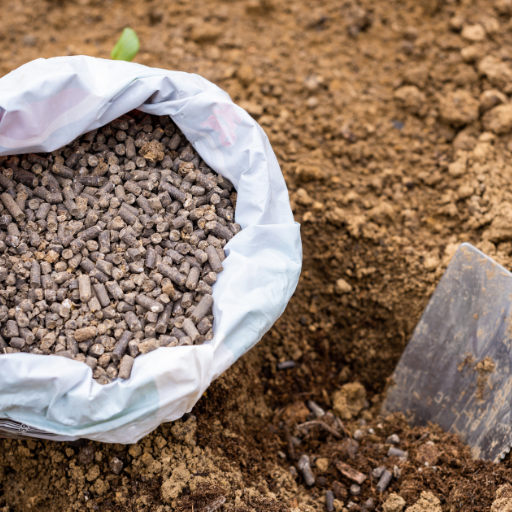
To improve soil quality using chicken manure pellets, the pellets should be worked into it for an improved structure, fertility and microbial activity. They have high quantities of essential micro-nutrients like nitrogen, phosphorus and potassium that are important in plant growth. When done correctly, the application of chicken manure pellets increases organic matter, thus improving soil aeration, water holding capacity, and root development. Additionally, since this type of manure is organic, it supports beneficial microbes that help decompose organic matter, thereby increasing the nutrients available to plants. To optimize soil quality, apply the recommended rates according to soil test results but keep the moisture levels constant enough to promote microbial activity and release nutrients. Always make sure you compost your manure before applying them rather than use raw manure with possible pathogen issues.
Enhancing Soil Aeration And Structure
Improving soil aeration or structure with chicken manure pellets involves several critical steps. First, spread evenly over the surface, then mix it thoroughly into the top 6-8 inches of the ground. The incorporation process helps create pockets of air, and roots can grow down into them while at the same time allowing water movement through pores. These include binding with soil particles and forming aggregates that reduce compaction by loosening soils promoting good aeration while lowering resistance for root penetration into soils. While decaying over time, this ratio improves friability, making the easy establishment of strong rooting systems by plants possible on such soils where regularly turning in organic matter like chicken manure is very necessary for maintaining healthy, moist well, aerated, fertile soils.
Adding Organic Matter and Micronutrients
By adding chicken manure pellets to your soil, you are also increasing its organic matter content and micronutrient profile. In addition to enhancing moisture retention, it penetrates better into compacted soils and provides sustainable nutrient sources that aid in improving their structure and nutrient availability. Chicken manure decomposition releases such important micro-nutrients as calcium, magnesium and sulfur that are vital for plant health. These include the micronutrients that aid in regulating enzymatic processes, chlorophyll production, and general plant metabolism. Therefore, the continuous addition of organic matter from chicken manure increases the soil’s cation exchange capacity (CEC), enabling it to hold on to more nutrients for release to plants. This balance in nutrient profile promotes strong growth and results in resilient soil ecosystems.
Long-term Benefits To Soil Health
With time, applying chicken manure pellets consistently is able to maintain soil health continuously improved by it. One of the major long-term benefits is the increase in organic matter content, which is crucial for maintaining soil structure, improving water holding capacity, and enhancing an environment for beneficial microbes.This organic material binds with soil particles, thus improving their aggregation and making them less compacted while increasing aeration by reducing the resistance of soils toward roots. Over time, this decomposing organic stuff adds to your soil’s friability, hence facilitating the easy establishment of strong root systems in such areas where regular incorporation of organic matter like chicken manure pellets ensures that you maintain healthy well, moist, aerated, and fertile soils.
Additionally, the continued use of chicken manure pellets improves the nutrient status of soils over time. The parameters mentioned, derived from long-term research, indicate significant increases in macronutrient levels, including nitrogen (N), phosphorous (P), and potassium (K). The three nutrients are essential for both plant growth and metabolic functions; for example, due to their slow-release properties, when organic matter decays, the amount of nitrogen present can rise even by 15%, providing a constant source of nutrients for plants.
In addition, the combination of chicken manure pellets consistently enhances CEC in soils. This translates into a higher CEC, indicating its ability to hold more essential cations such as potassium, calcium, and magnesium, which are important for plants’ nutrition. Recent research studies have shown an increase in CEC by about 10-20%, resulting in improved nutrient use efficiency and decreased fertilizer application rates with time.
Ultimately, sustainable agriculture calls for increased organic matter content that improves soil structure and holds nutrients while minimizing losses especially through leaching.
Environmental and Sustainable Benefits of Using Chicken Manure Pellets
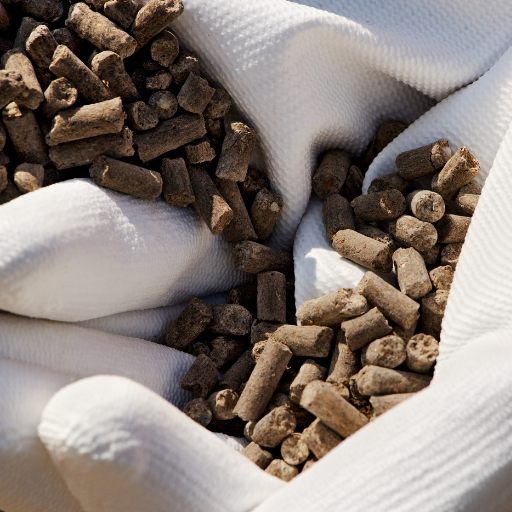
Chicken manure pellets are a great fertilizer to use because they are associated with environmental sustainability in many ways. The first is that chicken manure is a renewable resource that recycles the waste products from poultry farming; thus, landfills and greenhouse gas emissions are reduced. Chicken manure pellets have high nutrient content, making synthetic fertilizers less necessary because they require a lot of energy and can lead to soil and water pollution. Nutrient runoff into water bodies is mitigated by this organic approach, which also curbs eutrophication and supports aquatic ecosystems. Moreover, chicken manure retains more water in soil, which means there will be no need for irrigation so that water can be used efficiently in agricultural practices. Chicken manure pellets release nutrients slowly, ensuring a continuous supply of essential elements while minimizing the risk of nutrient leaching that may harm natural resources.
What Makes Composted Chicken Manure a Sustainable Choice?
Composted chicken manure is sustainable for several reasons. First, it contains vital plant nutrients such as nitrogen, phosphorus, and potassium. According to technical parameters, composted chicken manure can contain 4 percent nitrogen (N), 3 percent phosphorus (P2O5), and 2 percent potassium (K2O). This yields a well-balanced nutrient profile that stimulates strong plant development.
The other reason is ability to enhance soil structure. Organic matter found in composted chicken manure improves soil’s ability to hold water and allow air circulation, promoting sustainable plant root system health and reducing irrigation needs. Studies show that about a 22% increase in soil organic carbon within one year could be achieved by adding this organic amendment, leading to considerable long-term improvements in soil health.
Additionally, composted chicken manure releases its nutrients slowly as plants naturally take them up.This prevents nutrients from being washed away by rain or irrigation water into rivers, where they may harm living organisms.Composed material continues releasing nutrients for some time, hence making it a reliable source of nutrients that is both environmentally and economically efficient.
Lastly, composted chicken manure allows poultry waste to be used as an alternative to landfilling, reducing methane emissions. Research estimates that diverting chicken manure from landfills can lower methane emissions by 50 % or more, thus confirming its eco-friendliness. Consequently, when agricultural practices incorporate composted chicken manure, they support not only sustainable crop production but also a circular economy.
Can Using Chicken Manure Pellets Help Reduce Waste?
This is possible with pellets from chicken manure which minimizes waste. One fact is through turning poultry waste into pellets instead of allowing it to accumulate in landfills thereby reducing methane release and promoting more effective disposal processes. Secondly, these pallets enhance soil fertility and structure, for instance, after being applied as soil amendments, hence minimizing the requirement for synthetic fertilizers derived mainly from non-renewable sources. Moreover, chicken manure pellets provide a sustainable solution to managing poultry waste thus aligning agricultural practices with environmental conservation efforts. In line with this practice, it mitigates waste and promotes recycling within the farming industry, enhancing a more sustainable and circular economy.
Other Questions About Organic Chicken Manure
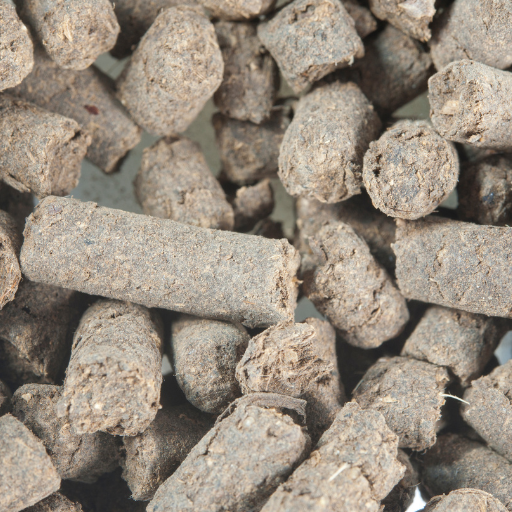
When considering whether chicken manure pellets reduce waste, one should consider their contribution to waste management and soil improvement. Additionally, these nutrients released by chicken manure improve soil fertility. This is really important because methane is a potent greenhouse gas and reducing its emissions is necessary. Besides, using chicken manure pellets as natural fertilizers reduces dependence on synthetic ones that may be derived from non-renewable sources. Chicken manure pellets repurpose poultry waste into valuable agricultural inputs, supporting sustainable farming practices and a circular economy.
Can Fresh Manure Be Used Directly in the Garden?
Fresh manure can generally not be used directly in the garden. Fresh manures have high levels of nitrogen and ammonia which could burn plants and inhibit seed germination. In addition, raw manures may contain pathogens like E.coli or Salmonella which poses risks to human health. Therefore, it is recommended that you compost the manure before applying it on the farm. Composting will remove harmful pathogens from your pile thus making it safer for use as a soil amendment.
What Should You Do If Your Lawn Has Excess Nitrogen?
There are several steps you can take if your lawn has too much nitrogen in it. First, water deeply to remove excess nitrogen from the soil where possible. This will help prevent soluble nitrates compounds that cause plant burn and nutrient imbalance, by flushing them away from root zones into lower parts of soils or entirely out of root zone by leaching water down through permeable layers below plants’ roots system toward groundwater table beneath them. When doing this ensure at least 1-2 inches of water are applied to maximize leaching potential. Secondly, avoid adding more nitrogen-rich fertilizers but instead use balanced or phosphorus-rich fertilizers for replacement purposes. As a result, nitrogen can be absorbed by these materials, which help balance carbon-nitrogen ratios by absorbing excess nitrogen. For instance, straw, wood chips, or sawdust are some of the carbon-rich materials that can be used for this purpose. Lastly, aerate your lawn to improve its structure and increase microbial activity, leading to better uptake of nutrients and root development. Nitrogen levels should be monitored through frequent soil tests as this will help determine necessary management practices.
Are There Any Potential Downsides to Using Chicken Manure Pellets?
These are the potential cons of using chicken manure pellets as a fertilizer: Firstly, the high nitrogen content can imbalance nutrients and cause plant burns if not applied properly (Singer et al., 2005). The nitrogen content of chicken manure is variable – it ranges from about 1.1% to 1.8%, depending on the source (Kabir et al., 2004).
Secondly, chicken manure pellets often have an unpleasant smell, particularly when wet. This smell might become off-putting to gardeners working outdoors or residents who live nearby gardens where such products are used. Moreover, storing these pellets improperly or handling them carelessly attracts pests such as rats.
Lastly, while composted chicken manures generally have a reduced risk of containing pathogens, there’s still a slight chance for contamination if composting is incomplete or improperly managed (Heuer et al., 2016). Therefore, it is advisable to ensure chicken manure pellets are sourced from reputable suppliers who follow stringent composting protocols. Thus, concerns about the possible presence of pathogens emphasize how critical it is to handle and use chicken manure pellets with caution.
Reference sources
- Crop Fertility Services
- Source: Analysis of Pelleted Chicken Manure
- Summary: This source offers a thorough analysis of pelleted chicken manure, detailing its nutrient composition and benefits for organic farming. The document validates the feasibility of using chicken manure pellets by highlighting their nutrient density and practical applications in improving soil fertility.
- Bio Conferences
- Source: Practical Use of Fertilizers from Chicken Manure
- Summary: This paper explores the utilization of an organic fertilizer obtained from poultry waste. It discusses the practicality and effectiveness of these fertilizers in agricultural settings, thereby confirming the viability of chicken manure pellets as a high-quality organic fertilizer.
- The Poultry Site
- Source: Chicken Manure and Crop By-Products Generate Quality Fertilizer Without Odor
- Summary: This study examines the combination of chicken manure with crop by-products to produce an effective, odorless fertilizer. The findings support the feasibility and environmental benefits of using chicken manure pellets as a sustainable and efficient organic fertilizer solution.
Frequently Asked Questions (FAQs)
Q: What are organic chicken manure pellets?
A: Organic chicken manure pellets are a type of garden fertilizer made from poultry manure. They are nutrient-rich, offering a 4-3-2 N-P-K ratio, which provides essential nutrients to your plants. These pellets are fully composted, dehydrated, and can be used in organic gardening to boost plant growth.
Q: How does chicken manure help in organic gardening?
A: Chicken manure helps by adding organic matter and essential nutrients to the garden soil, enhancing its fertility and structure. This organic fertilizer supports healthy plant growth by providing available nitrogen and other key nutrients.
Q: Can I use chicken manure pellets in my vegetable garden?
A: Yes, chicken manure pellets are approved for organic production and are excellent for use in a vegetable garden. They help in improving soil health and providing the necessary nutrients for vegetables to thrive.
Q: How do I apply chicken manure pellets to my garden?
A: To apply chicken manure pellets, scatter them evenly across the garden soil at the recommended rate, and lightly rake them in. Water the area after application to help the pellets break down and release nutrients to your plants.
Q: Are chicken manure pellets safe to use around pets and children?
A: Chicken manure pellets are made from fully composted poultry manure and are generally safe to use around pets and children when applied according to the manufacturer’s instructions. However, it’s best to keep pets and children away from freshly fertilized areas until the pellets are watered in and the soil is dry.
Q: What benefits do fertilizer pellets offer compared to other forms of manure?
A: Fertilizer pellets offer several benefits over other forms of manure. They are easy to handle, store, and apply. Additionally, because they are dehydrated and composted, they are less likely to carry pathogens or weed seeds.
Q: How often should I use chicken manure pellets in my garden or lawn?
A: It is recommended to apply chicken manure pellets to your garden or lawn during the growing season, typically once in the spring and once in the fall. However, the frequency can vary depending on the specific needs of your plants and soil conditions.
Q: Can chicken manure pellets be used in organic farming?
A: Yes, chicken manure pellets are made from organic ingredients and are suitable for use in organic farming. They are an excellent source of nutrients and help in maintaining the fertility of organic farm soils.
Q: Do chicken manure pellets have any odor?
A: Chicken manure pellets generally have a mild, earthy odor due to the poultry manure content. However, this odor is significantly reduced compared to fresh chicken litter because the pellets are fully composted and dehydrated.
Q: Is there a difference between chicken manure pellets and chicken crumble?
A: Yes, chicken manure pellets are formed into small, compact pellets for easy application, while chicken crumble is a looser form of dried poultry manure. Both are nutrient-rich, but pellets are usually preferred for their ease of use and controlled release of nutrients.






